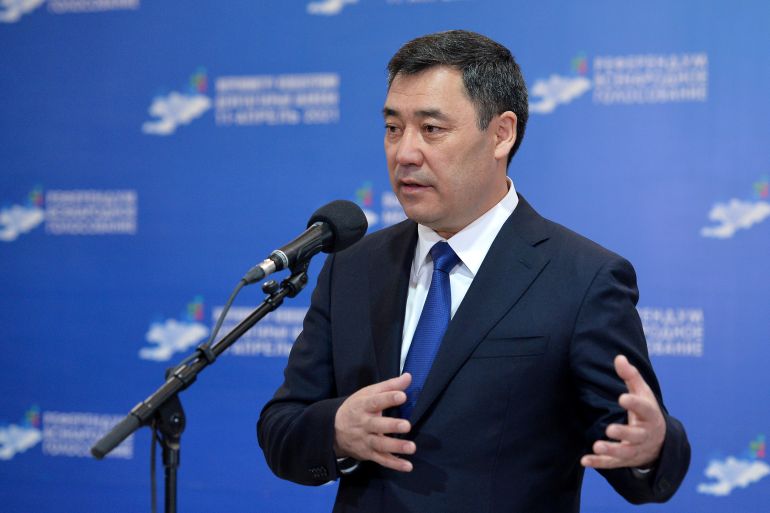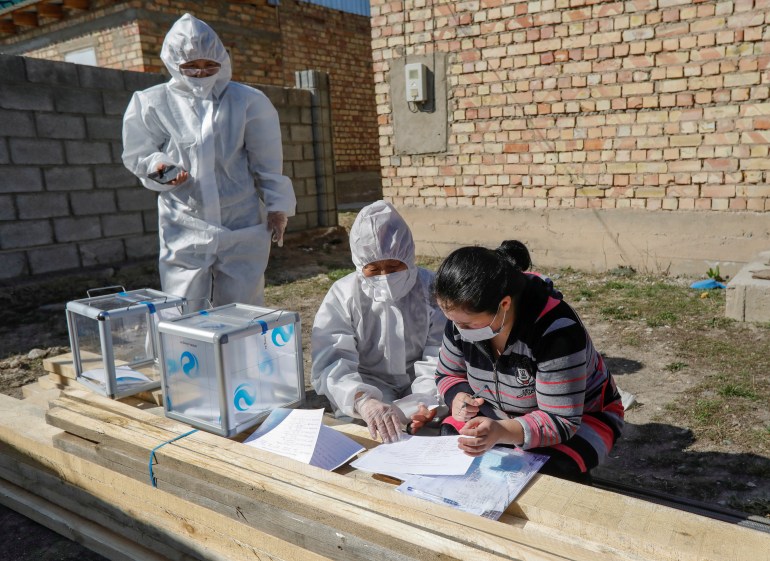Kyrgyzstan voters back presidential rule in referendum
Preliminary results show strong majority support reforms handing greater powers to the presidency, amid a low turnout.

Voters in Kyrgyzstan have supported handing greater powers to the presidency in a referendum, confirming public trust in the populist head of state Sadyr Japarov, although the turnout was low.
Preliminary Central Election Commission data based on 75 percent of ballots found a majority of voters – 79 percent – supported the reform, although total turnout was just above the 30 percent threshold required to make the referendum on Sunday valid.
Keep reading
list of 4 itemsMurder of woman in Kyrgyzstan triggers bride kidnapping protests
Kyrgyzstan’s Sadyr Japarov: From a prison cell to the presidency
Kyrgyzstan’s complex crisis: What you need to know in 500 words
Japarov and his supporters also hope a strengthened presidency will make the country more stable after violent revolts toppled its leaders in 2005, 2010 and in 2020, when Japarov was catapulted from a prison cell and into office.
A poll commissioned by the United States-based International Republican Institute and published this month found Japarov was by far the most trusted politician in the country.
The percentage of voters who believed Kyrgyzstan was heading in the right direction jumped from 41 percent last August – when Japarov’s predecessor Sooronbai Jeenbekov was in charge – to 70 percent in February and March, the poll data showed.
Japarov proposed the reform after being swept to power last October by violent protests that were triggered by the announcement of pro-Jeenbekov parties’ landslide victory in a parliamentary election.
A former member of parliament and senior official, Japarov had been serving a prison term for his role in the kidnapping of a regional governor as part of a political protest. His sentence has since been overturned.
In contrast to its neighbours, when Kyrgyzstan gained independence from the Soviet Union in 1991 it adopted a political system that allowed both parliament and the presidency to wield significant powers – forcing its leaders to seek the backing of broader elites.

‘Power grab’
The constitutional reform will bring the political system of the Central Asian nation closer to that of its ex-Soviet neighbours, such as Kazakhstan and Uzbekistan, making it easier for Japarov to push through his policies.
Adis Asanov, a 65-year-old pensioner, told AFP in Bishkek he had voted for the new constitution because of his disappointment with parliament’s lawmakers who had “bought their seats and lobbied their own corrupt interests”.
“Japarov’s government promises to work for the people. I personally believe him,” Asanov said.
Meanwhile, a 32-year-old entrepreneur who only gave his first name, Bakyt, told Reuters news agency: “I voted against (the reform) because this is a power grab.”
“All the power must not be given to one person.”
Anara Nasyrova, 61, told AFP news agency she had voted no in the referendum and did not trust Japarov.
“What happened to his promises to fight corruption? We see only the usual raiding,” she said. “He doesn’t have the teeth or the brains for reforms.”
Local critics dubbed the hastily drafted document a “Khanstitution”, evoking the powerful patriarchs who ruled Central Asia in centuries gone by.
The Organization for Security and Cooperation in Europe and the Council of Europe’s Venice Commission criticised the lack of “meaningful and inclusive public consultations and debate in parliament” before the basic law was put to the people.
In a joint opinion published in March, the two bodies also raised fears over the “overly prominent role and prerogatives of the president”.